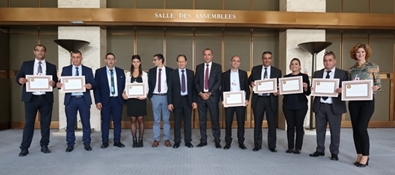Geneva International Centre for Justice (GICJ) organises Human Rights Training Courses on International Law and Human Rights Mechanism. Our courses are designed for lawyers, university students, human rights activists, journalists, diplomats, NGO members and anyone else with an interest in human rights. Please read on for a general overview of our courses.
| Introduction |
Geneva International Centre for Justice (GICJ), is an independent, international, non-governmental organization. Headquartered in Geneva, the United Nations serves as a central mechanism for much of GICJ’s work. GICJ actively participates in UN meetings, including Human Rights Council (HRC) sessions.
GICJ strongly agrees with the United Nations’ acknowledgement of the “fundamental importance of human rights education and training in contributing to the promotion, protection and effective realization of all human rights.” It is in following with this belief and its desire to empower young professionals and human rights activities to get engaged in the protection and promotion of human rights that GICJ organizes Human Rights Training Courses.
| About the Training Course |
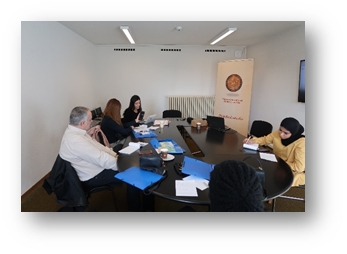 Human rights lie at the core of each training course, but the training also brings together a diverse array of subjects relevant to human rights and their integration into diplomacy, international and multilateral relations. The training includes both a theoretical and practical component.
Human rights lie at the core of each training course, but the training also brings together a diverse array of subjects relevant to human rights and their integration into diplomacy, international and multilateral relations. The training includes both a theoretical and practical component.
Amongst other subjects, the theoretical part includes information on human rights; the UN, its history, bodies and mechanisms, including the Office of the High
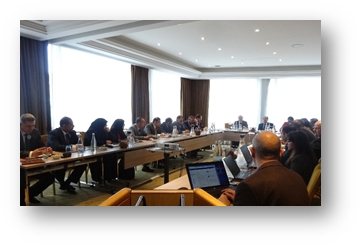 Commissioner for Human Rights, the Human Rights Council, and the Treaty Bodies. The training course provides participants with a unique opportunity to deepen their knowledge and understanding of the workings of the UN system, as well as the role of civil society in UN activities.
Commissioner for Human Rights, the Human Rights Council, and the Treaty Bodies. The training course provides participants with a unique opportunity to deepen their knowledge and understanding of the workings of the UN system, as well as the role of civil society in UN activities.
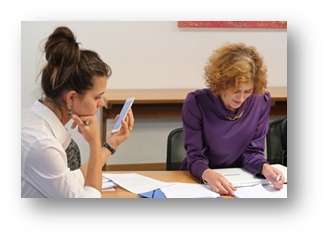 The practical component of the training typically includes attending meetings and sessions of human rights mechanisms and, depending on the length of the training, may include taking part in the organization and execution of a side-event. An integral part of the training focuses on teaching participants how civil society can document human rights violations according to international standards and interact with the UN and its bodies, especially the Human Rights Council and the Office of the High Commissioner for Human Rights.
The practical component of the training typically includes attending meetings and sessions of human rights mechanisms and, depending on the length of the training, may include taking part in the organization and execution of a side-event. An integral part of the training focuses on teaching participants how civil society can document human rights violations according to international standards and interact with the UN and its bodies, especially the Human Rights Council and the Office of the High Commissioner for Human Rights.
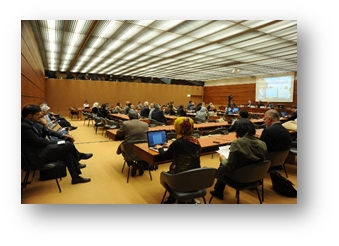 With regard to the Human Rights Council, trainees learn the procedures for preparing, submitting and delivering written and oral statements. For the Universal Periodic Review and the Treaty Bodies, participants are taught how civil society can submit information to be included in the reports for these sessions, as well as how to lobby Member States to help ensure that their organization’s issues and concerns are addressed by States. Participants will also learn how to interact and work with the Special Procedures (Special Rapporteurs), which are an invaluable instrument to the work of GICJ and all civil society.
With regard to the Human Rights Council, trainees learn the procedures for preparing, submitting and delivering written and oral statements. For the Universal Periodic Review and the Treaty Bodies, participants are taught how civil society can submit information to be included in the reports for these sessions, as well as how to lobby Member States to help ensure that their organization’s issues and concerns are addressed by States. Participants will also learn how to interact and work with the Special Procedures (Special Rapporteurs), which are an invaluable instrument to the work of GICJ and all civil society.
| Who can participate? |
The training course is open to all who have an interest in human rights, the United Nations and its human rights bodies, as well as in the role of civil society within these bodies. This training will provide you with useful and valuable knowledge whether you are a student, recent graduate, NGO, human rights activist, lawyer, professor, judge, diplomat, journalist (or any other professional, or just someone who wants to learn more about these topics).
| Training Course Objectives |
The general objective
- You will acquire the tools necessary to be part of the promotion and protection of Human Rights through the UN system. Through a theoretical and practical education, Geneva International Centre for Justice seeks to empower those interested in Human Rights and turn them into effective professionals.
- You will gain first-hand knowledge from a non-governmental organization that actively participates in the UN system, participates in UN meetings, and contributes its analysis and information to the UNHRC.
- After the course, you will have learned and mastered the inner workings of the UN system pertaining to Human Rights.
Under a theoretical training, you will gain extensive knowledge of the legal, political, and historical frameworks of the promotion of Human Rights within the UN system
- You will understand the core principles of the UN, its history, bodies and mechanisms, including the Office of the High Commissioner for Human Rights, the Human Rights Council, and the Treaty Bodies.
- You will understand how civil society, and NGOs such as GICJ, interact, contribute and participate in UN activities.
The clear objective of the practical training is to get you ready to practice Human Rights
- By the end of this course you will be able to prepare, draft, submit, and deliver written and oral statements to the UN Human Rights Council, prior to and during its regular Sessions.
- You will learn an invaluable instrument of the work of NGOs: interacting and working with the Special Procedures by drafting and submitting reports to the various Human Rights Treaty Bodies.
- You will have the chance to craft and submit reports and appeals to the various UN bodies within the Human Rights mechanism, including the Office of the High Commissioner for Human Rights.
- Depending on the agenda, you will also learn to organize and execute side events during the UNHRC Regular Sessions.
- The training will expose you to the possibility of becoming an effective lobbyist for Human Rights and how to engage with representatives of Member States.
| Certificate of Completion |
|
|
All successful participants will receive a Certificate of Completion from GICJ.
|
|
| Training Session Costs | |
|
Training fees vary depending on the duration and tailored aspects of a course. Fees typically cover the training itself and related materials. Participants are responsible for all personal costs to attend the training including, but not limited to, travel arrangements, accommodation, board and medical insurance.
|
|
| Registration Information |
If you are interested in participating in a training course, please email us at
The email must include:
o First/given name(s) as it appears on passport
o Last/family name(s) as it appears on passport
o Date and place of birth
o Current activity/work
o Education, field of study
o Nationality
o Current place of residence
Please verify that you have an entry visa to Switzerland or Europe (Schengen), bearing in mind that the registration in the course will not be sufficient for you to receive a VISA.
We look forward to seeing you at a future human rights training course!
GICJ Trainings
|
GICJ Training Workshop on International Human Rights Law and Human Rights Mechanisms - September 2017
|
GICJ, OHCHR and Meezan Organization for Human Rights Training Workshop - March 2017 |
|
|
Trainings Organized by GICJ in Collaboration with International Bodies |
GICJ Human Rights Training Courses
|
Internship and Volunteer Opportunities
|





